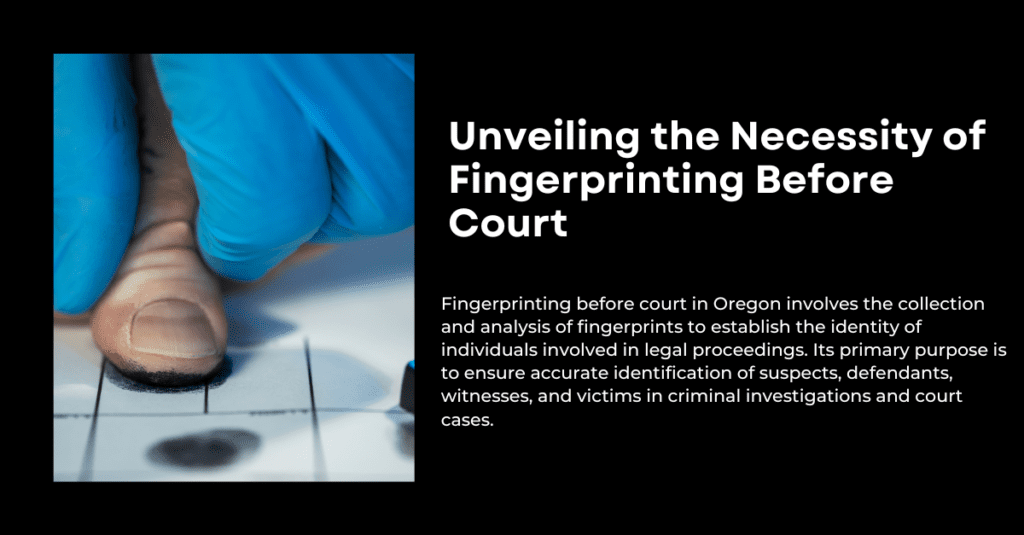
Fingerprinting before court in Oregon involves the collection and analysis of fingerprints to establish the identity of individuals involved in legal proceedings. Its primary purpose is to ensure accurate identification of suspects, defendants, witnesses, and victims in criminal investigations and court cases.
The practice of fingerprinting has a rich history in Oregon, dating back to the late 19th century when it gained recognition as a reliable method of identification. Over the years, advancements in forensic science and technology have enhanced the accuracy and efficiency of fingerprint analysis in the state.
Legal Basis for Fingerprinting
Constitutional Rights and Legal Precedents
Fingerprinting in Oregon operates within the framework of constitutional rights, including protections against unreasonable searches and seizures outlined in the Fourth Amendment of the United States Constitution. Legal precedents, such as court decisions and case law, further define the parameters for the collection and use of fingerprint evidence in court proceedings.
Legislation and Court Rules
Oregon state laws and court rules provide specific guidelines for the collection, analysis, and admissibility of fingerprint evidence in legal proceedings. These statutes ensure that fingerprinting practices adhere to legal standards and protect the rights of individuals involved in the criminal justice system.
Role of Fingerprinting in Criminal Justice
Ensuring Proper Identification
Fingerprinting plays a crucial role in Oregon’s criminal justice system by ensuring the proper identification of individuals involved in criminal activities. Each person’s fingerprints are unique, providing a reliable means of identification that can withstand scrutiny in court.
Preventing Fraud and Impersonation
In Oregon, fingerprinting helps prevent fraud and impersonation by linking individuals to specific fingerprints. This is particularly important in cases of identity theft, document forgery, and other forms of fraud that threaten the integrity of the legal system and public safety.
Enhancing Public Safety
The use of fingerprinting in Oregon contributes to public safety by aiding law enforcement in apprehending suspects, prosecuting offenders, and preventing future crimes. By accurately identifying individuals involved in criminal activities, fingerprinting helps maintain law and order within the state.
Understanding the Fingerprinting Process
Collection Methods and Techniques
Oregon law enforcement officers are trained to collect fingerprint samples using various methods, including traditional ink-and-paper techniques and modern electronic scanners. These methods ensure the accurate capture of fingerprint data for analysis and comparison.
Analysis and Database Integration
Fingerprint samples collected in Oregon are analyzed by forensic experts using specialized software and databases. These databases contain records of known fingerprints, allowing investigators to compare collected samples with existing records to identify individuals or establish connections to criminal activities.
Importance of Fingerprinting in Court Proceedings
Evidence Admissibility
Fingerprint evidence is widely accepted in Oregon courts as reliable and admissible evidence. Courts recognize the scientific validity of fingerprint analysis and often admit fingerprint evidence to establish identity or link suspects to crime scenes.
Establishing Identity and Linking to Crime
Fingerprinting plays a crucial role in Oregon court proceedings by establishing the identity of individuals involved in criminal activities and linking them to specific crimes. Fingerprint evidence provides a definitive link between suspects, victims, and crime scenes, aiding in the investigation and prosecution of criminal cases.
Privacy and Ethical Considerations
Safeguarding Personal Information
In Oregon, measures are in place to safeguard the privacy and confidentiality of individuals’ biometric data collected through fingerprinting. Strict protocols govern the storage, access, and use of fingerprint records to ensure they are protected from unauthorized disclosure or misuse.
Limitations and Concerns
Despite its reliability, fingerprinting in Oregon is not without limitations and concerns. Factors such as the quality of fingerprint samples, human error in analysis, and challenges in interpretation can affect the accuracy and reliability of fingerprint evidence. Additionally, there are concerns about the potential misuse of fingerprint data and the risk of false identifications.
Impact on Legal Proceedings
Role in Investigation and Prosecution
Fingerprinting in Oregon plays a significant role in all stages of the criminal justice process, from the initial investigation of crimes to the prosecution of offenders in court. It provides law enforcement agencies and prosecutors with valuable evidence to build cases against suspects and secure convictions.
Influence on Court Decisions
Fingerprint evidence can have a decisive impact on court decisions in Oregon, influencing judges and juries in their assessments of guilt or innocence. Courts rely on fingerprint analysis to establish facts, corroborate witness testimony, and determine the credibility of evidence presented during trial proceedings.
Variations in Fingerprinting Practices
Jurisdictional Differences
Fingerprinting practices in Oregon may vary slightly from those in other jurisdictions due to state-specific laws, regulations, and procedures. However, the underlying principles and standards for fingerprint collection, analysis, and admissibility remain consistent with national best practices.
Technological Advancements
Advancements in fingerprinting technology have been adopted in Oregon, enhancing the efficiency and accuracy of fingerprint analysis. Automated fingerprint identification systems (AFIS) and biometric scanners have streamlined the process of matching fingerprints and comparing them against existing databases, enabling law enforcement agencies to process large volumes of fingerprint data more efficiently.
Frequently Asked Questions (FAQs)
Why is fingerprinting necessary before court in Oregon?
Fingerprinting is necessary before court in Oregon to establish the identity of individuals involved in legal proceedings and to provide reliable evidence linking them to specific crimes or activities.
How reliable is fingerprint evidence in Oregon courts?
Fingerprint evidence is generally considered reliable in Oregon courts, as each person’s fingerprints are unique and can serve as a definitive means of identification.
Can fingerprinting be challenged in Oregon court?
Yes, fingerprinting can be challenged in Oregon court proceedings, particularly regarding the admissibility, reliability, or interpretation of fingerprint evidence.
What happens if someone refuses to be fingerprinted in Oregon?
Refusal to comply with lawful orders to provide fingerprints in Oregon may result in legal consequences. Law enforcement officers in Oregon have the authority to compel individuals to submit to fingerprinting when they are under arrest or as part of a criminal investigation. Refusal to comply could lead to additional charges for obstruction of justice or contempt of court.
Are there alternatives to fingerprinting in court proceedings in Oregon?
While fingerprinting is a commonly used method of identification in Oregon court proceedings, there are alternative methods available. These include DNA analysis, facial recognition technology, and iris scanning. However, the suitability of each method depends on the specific requirements of the case and the availability of evidence.
In conclusion, fingerprinting before court in Oregon serves as a vital tool in the criminal justice system, ensuring accurate identification of individuals and providing reliable evidence in legal proceedings. By understanding the significance and process of fingerprinting, legal professionals, law enforcement agencies, and the public can appreciate its importance in maintaining public safety and upholding the rule of law in Oregon. Despite challenges and controversies, fingerprinting remains an integral part of forensic science, contributing to the resolution of criminal cases and the administration of justice in the state.

